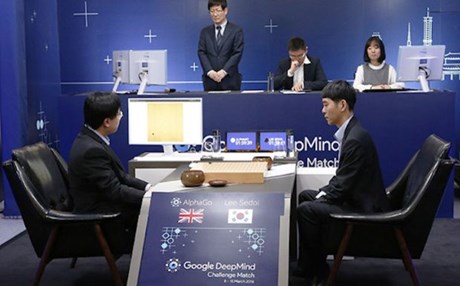chevron_left
-
play_arrow
NGradio So good... like you
Google DeepMind’s AlphaGo program triumphed in its final game against South Korean Go grandmaster Lee Sedol to win the series 4-1, providing further evidence of the landmark achievement for an artificial intelligence program.
Lee started Tuesday’s game strongly, taking advantage of an early mistake by AlphaGo. But in the end, Lee was unable to hold off a comeback by AlphaGo, which won a narrow victory.
After the results were in, Google DeepMind co-founder Demis Hassabis called today’s contest “One of the most incredible games ever,” saying AlphaGo mounted a “mind-blowing” comeback after an early mistake.
#AlphaGo wins game 5! One of the most incredible games ever. To comeback from the initial big mistake against Lee Sedol was mind-blowing!!!
— Demis Hassabis (@demishassabis) March 15, 2016
This was the fifth game in seven days, in what was a draining, emotional battle for Lee. AlphaGo had won the first three, but Lee took the fourth game on Sunday.
He remained in his seat as the game’s results were announced, his eyes swelling with tears. In a postgame press conference, he expressed regret over his defeat. “I failed,” he said. “I feel sorry that the match is over and it ended like this. I wanted it to end well.”
Throughout the match, Lee won praise from observers for a determined, creative approach to AlphaGo, an opponent that is invulnerable to stress and fatigue. In Tuesday’s press conference, Chris Garlock, one of the live commentators said the match was composed of “five beautiful and historic games,” adding, “I think we’ll be studying these for years to come.”
Due to Go’s complexity and the importance of reaction and intuition, it has proved harder for computers to master than simpler games such as checkers or chess. Go has too many moves for a machine to win by brute-force calculations, which is how IBM’s Deep Blue famously beat former world chess champion Garry Kasparov in 1997.
AlphaGo’s win over Lee is significant because it marks the first time an artificial intelligence program has beaten a top ranked Go professional, a victory experts had predicted was still years away. AlphaGo beat European Go champion Fan Hui in October, but Lee was expected to be a tougher challenge.
The match has brought an unusual level of attention to Go, a game that is popular in east Asia but not widely played in the west. Go insiders say they are not used to being in the spotlight. “I’ve never seen this much attention for Go, ever,” Ha Jin Lee, secretary general at the International Go Federation and guest commentator on Tuesday’s live broadcast, said.
Google DeepMind have talked about applying the deep neural networks and machine learning techniques that AlphaGo used to master Go to more pressing areas such as healthcare and robotics. But with AlphaGo’s victory in the books, Hassabis was tight-lipped, saying his team will need to return to the UK and spend “weeks or months” going over the results of the match before announcing their next moves.
Source: theguardian.com
Written by: New Generation Radio
Similar posts
ΔΗΜΟΦΙΛΗ ΑΡΘΡΑ
COPYRIGHT 2020. NGRADIO





















Post comments (0)